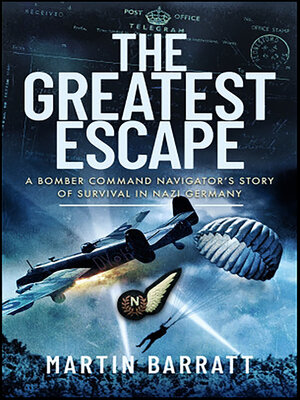The Greatest Escape
ebook ∣ A Bomber Command Navigator's Story of Survival in Nazi Germany
By Martin Barratt

Sign up to save your library
With an OverDrive account, you can save your favorite libraries for at-a-glance information about availability. Find out more about OverDrive accounts.
Find this title in Libby, the library reading app by OverDrive.



Search for a digital library with this title
Title found at these libraries:
| Library Name | Distance |
|---|---|
| Loading... |
This is the story of a wartime bomber, its crew and of a tantalizing detective story unfolding over nearly a quarter of a century of intensive research. It is also a story of courage, fortitude and endurance and of one man's will to survive against seemingly insurmountable odds. Bomber Command's horrific loss rate during the Second World War cannot be underestimated. Of the 120,000 young aircrew who served, 55,373 were to perish, most of them losing their lives over the night skies of Europe. The Battle of the Ruhr, the campaign to destroy the industrial heartland of Germany which raged between March and July 1943, was both savage in intensity and costly in terms of aircrew. Prospects for survival for anyone involved in operational flying with Bomber Command at that time were particularly bleak. Young aircrew could expect a lifespan measured in terms of weeks where seemingly only a fiery death in an exploding aircraft or captivity as a Prisoner of War awaited. It is with this period that the book is primarily concerned and, more specifically, with the crew of Halifax JB869 of 102 Squadron, of which the author's father was the navigator, and its loss on the night of 4 May 1943. He survived baling out and, later, an attempted lynching on the ground to become a Prisoner of War. But his escape from his shattered aircraft was only the first of many episodes in his two and a half years of captivity that would see him pushed to the limits of endurance and face death more than once. Like so many veterans the author's father chose not to speak about his wartime experiences until quite late in his life and it was only after his death and the chance discovery of an archive of letters, logbooks, accounts and other material that the full story of his incredible series of escapes came to light. Through extensive research, including face-to-face interviews and correspondence with a significant number of ex-aircrew, the author has painstakingly pieced together the complete story of the crew of this aircraft, identifying and contacting relatives of each crew member and, for some, bringing closure after decades of not knowing how (or in some cases where) their loved one had met their deaths.







